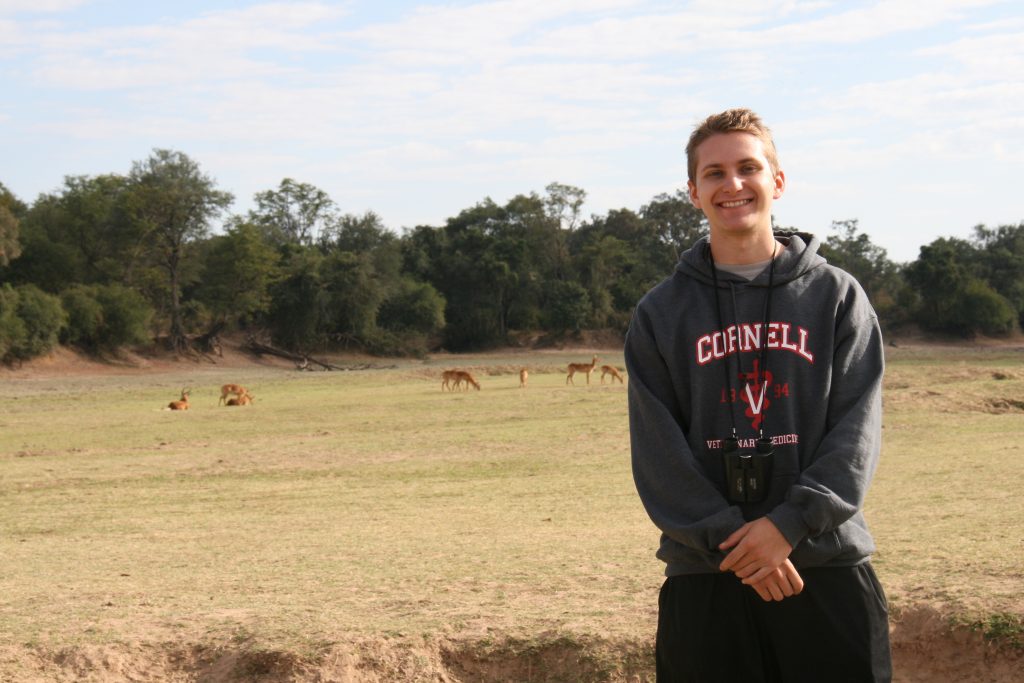My name is Eric Teplitz and I am a rising 2nd year veterinary student at Cornell. With an interest in infectious disease epidemiology, I participated in the Expanding Horizons Program with the goal of gaining applied research experience in the field. I established my research project with the Silent Heroes Foundation and the Lilongwe Wildlife Trust in Malawi, an organization that promotes wildlife rescue & research, advocacy, and conservation education. Illegal bushmeat and pet trading are prevalent practices in Malawi that are destructive to ecological health and biodiversity. The Lilongwe Wildlife Centre was established as a sanctuary for animals subjected to such crimes and aims to rehabilitate and release them into the wild.
I have been at the Lilongwe Wildlife Centre for the past seven weeks, and I have another two weeks before returning home. In my free time, I’ve had several opportunities to travel, visiting South Luangwa National Park in Zambia and Liwonde National Park in Malawi. I’ve also had the unique experience of scuba diving in Lake Malawi, which has a greater diversity of fish species than any other lake on Earth!
My research objective is to provide additional information for the Lilongwe Wildlife Trust’s primate release program. Release strategies of captive wildlife are based on several factors that determine if, when, and how an animal will be reintroduced. One such factor is the risk of disease transmission from reintroduced animals to wildlife populations and humans, as failure to evaluate these risks can lead to unintended disease communication.
Salmonella and Shigella are groups of bacteria that colonize the intestine and cause diarrhea and inflammation of the gut lining. They are spread via fecal-oral transmission – the bacteria are shed in the feces and subsequently ingested by another animal. These bacteria infect nonhuman primates and humans globally and are therefore critically important for both wildlife conservation and public health. Unfortunately, Salmonella and Shigella are difficult to treat medically, and consequently studying the patterns of shedding is important for informing disease management strategies through an understanding of transmission dynamics. At the Lilongwe Wildlife Centre, I am studying the shedding patterns of Salmonella and Shigella in primates.
The primary objective of my project is to identify temporal shedding patterns of Salmonella and Shigella as well as risk factors that affect shedding. Some examples include stress, age, sex, body condition, patient history, and concurrent parasitic infection. I designed a sampling schedule upon arrival, and currently I am collecting fecal samples for bacterial culture and diagnosing parasitic infections via fecal flotation. I have been evaluating stress through behavioral analysis, monitoring for behaviors that characteristically indicate stress in primates (such as pacing, self-grooming, and excessive scratching).
The project involves components of microbiology, primatology, and epidemiology, and the interdisciplinary expertise I gained during my first year of veterinary school has allowed me to conduct my research successfully. Designing and implementing an epidemiology study has been a useful learning experience as I find ways to adapt to logistical and technical constraints while in Malawi. Throughout the past several weeks, I have become more familiar with the procedures for primate integrations and reintroductions, which has guided my experimental design so that I can provide the most important information. In my remaining two weeks in Lilongwe, I will do my best to produce useful data!


